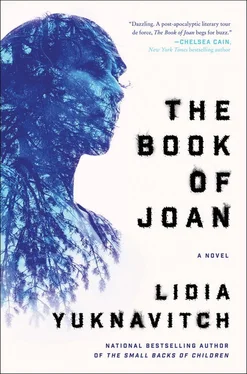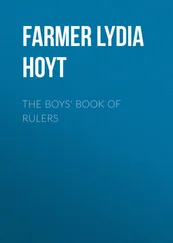A French child’s song.
One she knows by heart:
It was in the dark night,
On the yellowed steeple,
On the steeple, the moon
Like a dot on an i.
Moon, whose dark spirit
Strolls at the end of a thread,
At the end of a thread, in the dark
Your face and your profile?
Are you nothing more than a ball?
A large, very fat spider?
A large spider that rolls
Without legs or arms?
Is a worm gnawing at you,
When your circle lessens,
When your disk lengthens
Into a narrow crescent?
“Joan?” Leone touches her shoulder.
Joan wipes at her eyes for perhaps the ten-thousandth time. Fatherless and motherless children. Husbands and wives and lovers. Sisters. Brothers. Friends. All human relationships atomized. She looks at Leone. She wrenches the bloody earbuds from her ears. What is a human alone? A near-corpse dotting an endless landscape.
Every so often Joan and Leone had run across one stumbling toward death in the open terrain: a feral child. More often than not they’d die on the spot, or live for a while and then sputter toward death. Once, they managed to nurse one back to life for an entire year; then, one day, a day that haunts Joan still, the boy simply walked off the edge of a cliff before she could stop him. He turned back once to look at her, maybe smiled, or perhaps just lined his mouth with resolution, and he was gone. Forever she wondered what that look meant. Maybe that there are more things to want than life?
The last child they’d encountered alone was a different boy, so malnourished and exhausted his skin looked gray-blue, his eyes sinking into their skeletal holes. Month by month, he gained strength and muscle and heart. Finally, he was strong enough to talk about the tribes he’d seen “out there.” They thought he was delirious, or that somewhere along his journey he must have lost his wits. They nodded and smiled and gave him simple chores of survival. They taught him how to hunt and what to eat and how to make electricity and light and how to filter water and grow food.
The boy couldn’t remember his name—or didn’t care—so they’d renamed him Miles, as he’d come an enormous distance. One night, after Leone went night hunting for snakes, Joan and Miles sat near the fire, Joan staring so deeply into it she was barely present, Miles drawing in the dirt floor with a stick.
“You don’t believe me, do you?” he said, jamming the stick into the earth. “About the tribes, I mean?”
Joan’s fire trance broken, she looked over at him, the flames dancing across his face, making him look animated. “It’s not that I don’t believe you,” she hedged. “It’s just that I’ve never seen it myself. Just… just children, wandering alone or in very small groups, usually captured or killed by CIELs. They’d never allow tribes of adults to exist.”
He stared at her. He smiled. It really was a smile. But it didn’t indicate happiness, as it might have in some past. What he said next was stark and solemn: “If you don’t let me go back and tell them you are alive, I’m going to walk off of the edge of a cliff. Like the other boy.”
Joan stood up. Looked down at him. Miles did not flinch. He looked up at her, crossed his arms over his knees. “I will,” he said.
“You are not a captive here,” she said to him.
“Your caring for me is the only thing holding me here.” He returned his gaze to the fire.
For weeks, she and Leone took turns guarding him day and night. If she could just help carry him through this delusion, Joan thought, he might come back to his senses and… live. Whatever that meant. But each day he became more withdrawn, sometimes standing and staring at her with a bundle of kindling in his arms, or emerging from an aqua cave pool naked and gleaming and wearing the last traces of corporeal boyhood.
For weeks she and Leone argued.
“For Christ’s sake, let him go . He’s not a pet. He doesn’t belong to us. If he wants to walk away chasing some idiotic notion of wandering tribes, let him.” Leone cleaned her knife on the shin of her pants.
“He’ll die.”
“He didn’t die getting here, did he? And anyway, if he dies, it will be exactly as if he never came. Everyone”—Leone gestured in the air with her knife—“ everyone out here dies. Someday, even us.” She put the blade briefly to her lips.
That night, again at the fire, Miles spoke again. “There are people waiting for you out there, you know. There are other boys and girls and men and women and others who are waiting for your help.” This time Miles stood.
“I’m no help to anyone,” Joan said, her voice filled with low storm. “You wouldn’t understand.”
“I’m going to tell you a story. You’ll like it. It’s about a girl who turns into a song.”
Joan’s head snapped up. Song?
“Once there was a child warrior girl,” he began. And when he was finished, Joan was crying.
In the end, Joan extended her hand and made Leone cut off her pinkie finger, as well as a lock of her hair. She wrapped the severed finger with the hair, then wrote a letter on paper she’d learned to make from hemp over the years. She still didn’t believe the boy, but she let him walk away; in his shoulders and scapula, she could see the man he would become, if he made it to manhood. She didn’t believe him, but she did believe in letting him have his story. To have a story was to have a self.
Joan squats down and runs her hands along a row of PG-29 rockets, lifting one with both hands.
Leone eyes the rocket. “Christ, isn’t that what we used in Orléans? Back in the day?”
But Joan is falling into memory, and guilt again.
And who did you think you were when they called your name?
Did you think you were who they said, the sound of your name lifting up off of your body in a great crescendo, the sound turning always to fever and ritual and chant, the sound of your name driving masses of men, women, and children, their teeth gnashing, their bodies falling forward in their own brutal and quickening deaths? The mother kissing her son good night the night before the battle, the son still dreaming of talking animals, his sister’s soft breathing through her small nose in the bed near him, the father locking the doors—as if everyone were part of a story that would make history, and not a story that would engender slaughter.
Did the white of your war banner give you the right to make murder a beautiful story? Who were you at sixteen, your chest yet unformed, your shoulders and biceps balling up like a boy’s, your voice not low in your throat, but high, just under your jawline, a girl’s voice, a cheekbone beneath the blue light flickering like some alien insect at the surface of your skin? When they mindlessly followed you into the fire of battle, when they shed their despair and aimed their hope straight at your face, when they turned their eyes to yours and surrendered, smiling, when you sent them into siege and seizure and bloodletting—in the moments before their deaths, did your valiancy outweigh your heart? Did you even have a heart? When you walked them into hell, was your heart open?
Did the song in your head give you the right to kill them?
Her vision blurs. Sometimes she sees things that are not there. She is used to it and at the same time not. Her head light; she can’t feel her feet or hands. She looks up. When she looks back to her physicality she is in a floating room with slate-colored walls and floors. The windows black as space. It’s a room she’s never inhabited. A room made of pure imagination. Or of dread.
Читать дальше












